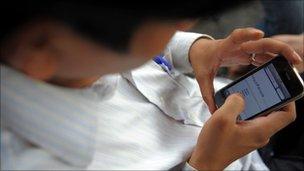Northern Ireland mobile phone customers face roaming problem
- Published

Ofcom estimates that it costs mobile customers along the border an additional £300 a year because their signal moves
"Welcome to Ireland" is an all too familiar message for people living along the border and trying to use their mobile phones.
Ofcom, which regulates the communications market, says east and north County Londonderry in particular Portstewart, and south Armagh and south Down are the worst affected areas.
Thirty per cent of those surveyed in south Armagh said the problem occurs every day.
Ofcom estimates that it costs customers along the border an additional £300 a year because they've made calls and gone online without realising that their signal was being provided by a company across the border.
It all comes down to water.
A phone signal is stronger when it travels over a stretch of water as there are no buildings to get in the way.
So even if there is a transmitter near you within Northern Ireland, your phone will pick up a stronger signal from further away if it only has to travel across water.
So customers next to the coast, Lough Foyle, and Carlingford Lough are particularly vulnerable even if they are not right next to the border.
Ofcom has been looking into whether customers know how to avoid the problem, and apparently most don't.
Only 18% have ever manually locked onto their own network, 11% have turned off roaming data, and only 3% have ever changed tariff or added a 'bolt on' to make sure they are paying less.
The majority of people avoid making calls or receiving calls or texts.
Jonathan Rose, Ofcom's Northern Ireland director, said: "The latest European Roaming Regulation places responsibility on mobile operators to take 'reasonable steps' to protect their customers for inadvertent roaming charges.
"We are writing to the operators to find out what actions they are planning to take to meet this new obligation."
To hear a full interview with Ofcom Northern Ireland, listen to the <link> <caption>NI Business News Podcast </caption> <url href="http://www.bbc.co.uk/podcasts/series/nibusiness/all" platform="highweb"/> </link> .
- Published6 July 2011
- Published28 March 2012